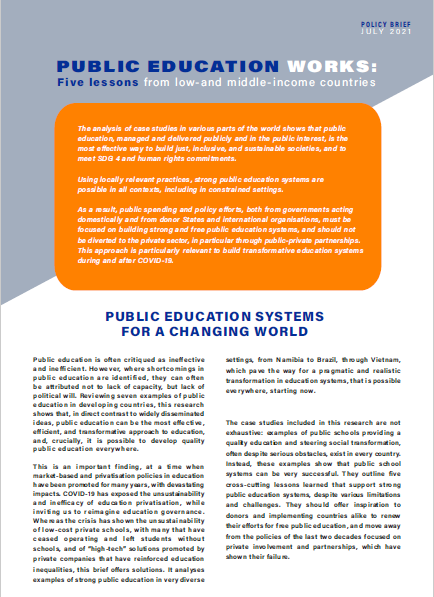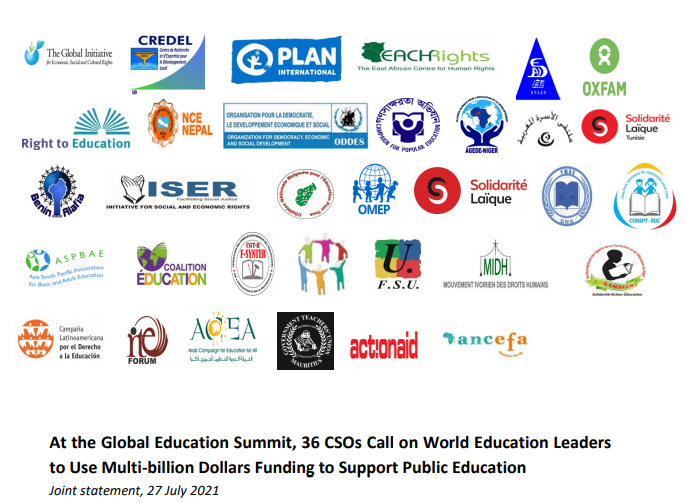
GI-ESCR and 36 CSOs call on world education leaders
NEW brief and statement: GI-ESCR and 36 CSOs call on world education leaders to use multi-billion dollars funding to support public education
GI-ESCR, together with a group of 36 organisations, is releasing today a new brief (EN, FR, ES) titled “Public Education Works: Five Lessons From Low and Middle-Income Countries”. In a statement accompanying the brief, we call on the Global Partnership for Education to use the money raised during the Global Education Summit (28-29 July), to support free public education and ensure that no funding is used to support commercial actors, in accordance with human rights requirements.
Both the brief and statement are available in EN, ES and FR.
Public Education Works: Five Lessons From Low and Middle-Income Countries | our policy brief

The policy brief reviews seven case studies in developing countries, showing that well-organised public education systems are possible everywhere, with political will and use of locally relevant practices. It conveys three key messages:
-
Public education, managed and delivered publicly and in the public interest, is the most effective way to build just, inclusive, and sustainable societies, and to meet SDG 4 and human rights commitments.
-
Using locally relevant practices, strong public education systems are possible in all contexts, including in constrained settings.
-
As a result, public spending and policy efforts, both from governments acting domestically and from donor States and international organisations, must be focused on building strong and free public education systems, and should not be diverted to the private sector, in particular through public-private partnerships.
Calling on the Global Partnership for Education and its partners to support public education and align with human rights | our statement
Based on this, we urge States and education stakeholders participating at the GPE Summit to ensure that GPE’s funding and technical engagement are aligned with the right to education, in particular by fulfilling the right to free, quality, inclusive public education, and specifically to:
-
Reinforce GPE’s support to free public education as part of its process to strengthen the operationalisation of its programs;
-
Maintain and reinforce the commitment that no public funding goes to commercial providers of, and actors in, education; and,
-
Work with UNESCO, including the IIEP, and the UN Office of the High Commissioner for Human Rights, as well as other relevant international and national institutions and civil society, to strengthen the operationalisation of human rights in its activities and Member States’ educational planning and practice.
GPE Member States, which are all parties to one or more treaties protecting the right to education, can also seek guidance in the Abidjan Principles on the right to education, which were adopted in 2019 and are the reference text to implement the right to education in the current context. In a new July 2021 resolution, the United Nations Human Rights Council asked States to invest the maximum of available resources in public education, and called on UN agencies to work with the GPE and civil society to provide technical support to States to realise the right to education in the COVID-19 and post-COVID context. The Council also recognised for the second time the Abidjan Principles, which recalls that “international assistance and cooperation, where provided, must reinforce the building of free, quality, public education systems”.




